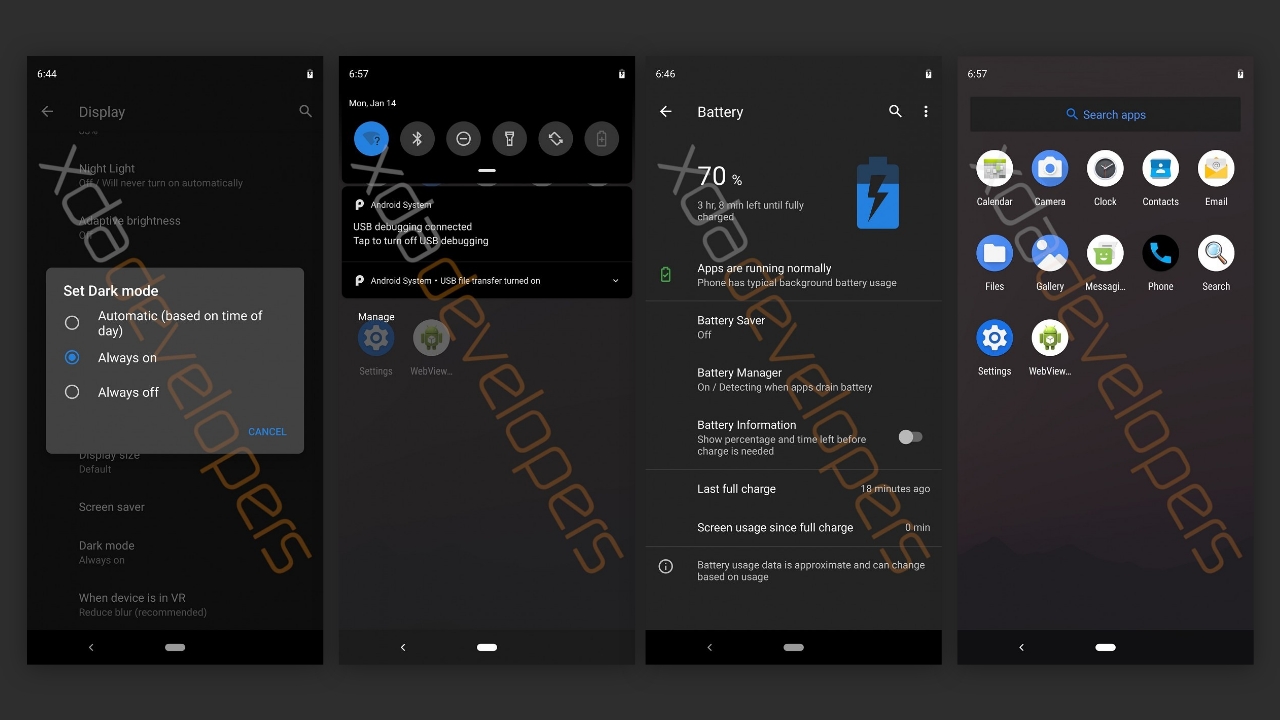Android Is Getting a System-Wide Dark Mode, and a Potential Desktop Mode
- Mehedi Hassan
- Jan 16, 2019
-
25
Google’s next upgrade to Android could feature a bunch of much-requested features. The folks at XDA Developers have gotten their hands on an early build of Android Q, running on the Pixel 3 XL, giving us an early look what’s to come.
The main new feature seems to be a new, system-wide dark mode for Android. The new dark mode will introduce a dark theme for the entire operating system, something which has been a long-requested feature on both Android and iOS. Although companies like OnePlus already provided similar experiences on their custom version of Android, the stock Android experience powering Google’s Pixel handsets and other devices never had a system-wide dark mode. The new dark mode may also come with an option to automatically force dark mode on apps that do not have a dark mode, too.
Windows Intelligence In Your Inbox
Sign up for our new free newsletter to get three time-saving tips each Friday — and get free copies of Paul Thurrott's Windows 11 and Windows 10 Field Guides (normally $9.99) as a special welcome gift!
"*" indicates required fields
XDA Developers reported that there is a new option called Force Desktop Mode for developers, which could introduce the ability to simply plug in your Android device to a monitor and get a desktop-like experience. That would be similar to something like Samsung DeX, or Microsoft’s Continuum experience on Windows 10 Mobile. If the feature does make it to the final Android Q release, it could be a huge deal for Google’s next-generation Pixel devices, as well as other new Android devices.
There are a bunch of other minor features in the early Android Q build, including new privacy features that let you give apps access to certain permissions like your location only when the app is in use, much like you can iOS. Google will likely start talking about Android Q sometime soon, probably at I/O this May.
Conversation 25 comments
-
skane2600
<p>All of these quasi-desktop "experiences" suffer from the same problem – they don't offer mobile functionality. An expensive mobile phone plus all the expense of desktop peripherals for a conventional PC gives us an inferior result. </p>
-
skane2600
<blockquote><em><a href="#397453">In reply to JG1170:</a></em></blockquote><p>As we've discussed before, you don't have to double-click to use Windows. On the other hand, anyone who has successfully played a video game on a console from the Atari VCS in the 70's all the way up to the Switch today would not be challenged by a double-click. That's basically most people in the US between the ages of 13 and 50.</p><p><br></p><p>Learning to do simple things in Windows is comparable to learning to do simple things in Android and iOS. Doing more complex things is harder on all systems. </p><p><br></p><p>In any case, those people who can do everything they need to do on their smartphones, don't need to dock it into desktop peripherals and are unlikely to own them.</p>
-
skane2600
<blockquote><em><a href="#397481">In reply to JG1170:</a></em></blockquote><p>You don't have to "turn off" double-click to avoid it. People don't bother avoiding it because it isn't that hard. You've never seen somebody miss their "poke" target or fail to perform their swipe properly? There's nothing inherently superior about these touch actions.</p><p><br></p><p><br></p>
-
skane2600
<blockquote><em><a href="#397500">In reply to Daekar:</a></em></blockquote><p>So you sit on your couch juggling the keyboard and mouse while squinting to see small details on your TV? It can be done, of course, but it wouldn't be a good experience.</p><p><br></p>
-
skane2600
<blockquote><em><a href="#397658">In reply to Daekar:</a></em></blockquote><p>Sure, but I don't think most people arrange their furniture around the use of their TV as a computer monitor. I guess for people with very large TVs, it wouldn't matter, but are they the type who would Macgyver their computer setup? </p>
-
dontbe evil
<p>dark mode only 9 years after windows phone 7</p><p>and "continuum" only 4 years after windows 10 mobile</p>
-
wocowboy
Premium Member<p>This is really meaningless speculation and fantasy, since it will be at least 5 years before the number of Android devices that use or can even be upgraded to 2019's "Q" will reach even 1%. Such is the sad, sad state of the Android OS. </p>
-
wocowboy
Premium Member<blockquote><em><a href="#397504">In reply to SenorGravy:</a></em></blockquote><p>It's sad because the sales of those Google "flagship" Pixel phones, with their at-release problems with the screen, camera, software, USB-C connector, and other issues, are miniscule when compared to other devices, and iPhones, which receive major OS updates as well as minor ones day/date they are released. Yes, they are the only manufacturer who makes iPhones and Apple has complete control over the software so they get timely updates, I've heard it all, but since I happen to believe that customer privacy and security of identity, information, health data, etc is of the utmost importance, I also believe that system updates should be passed on to customers in a VERY timely manner, not a year or year and a half after their introduction. It should not take a YEAR to figure out if an OS update will work on your products, imho. Samsung's track record on Android OS updates is not all that great, either. It is better than some device makers, but you are still waiting months and months after a major OS release before you ever see it on your phone, after both Samsung and your carrier "test" it and update all the modifications they glom on top of it. </p>
-
skane2600
<blockquote><em><a href="#397503">In reply to Jules_Wombat:</a></em></blockquote><p>A Windows tablet you have to tether to desktop equipment? Yeah, that would have been a big hit.</p>
